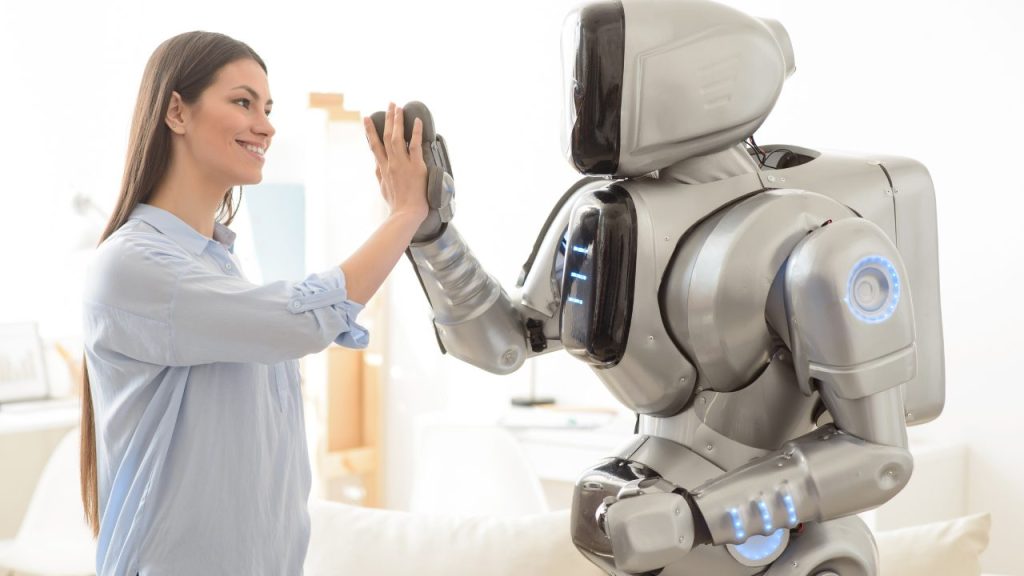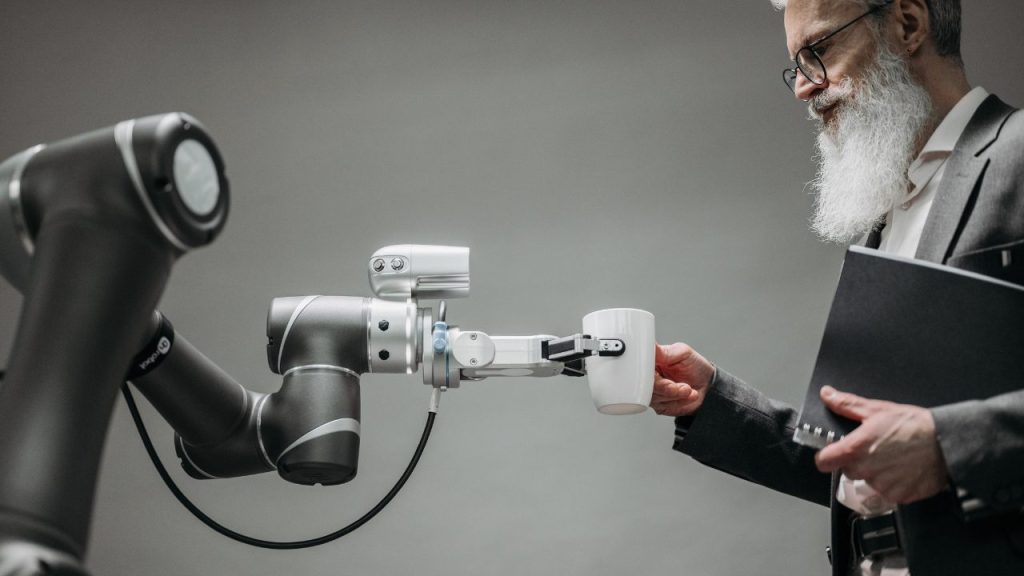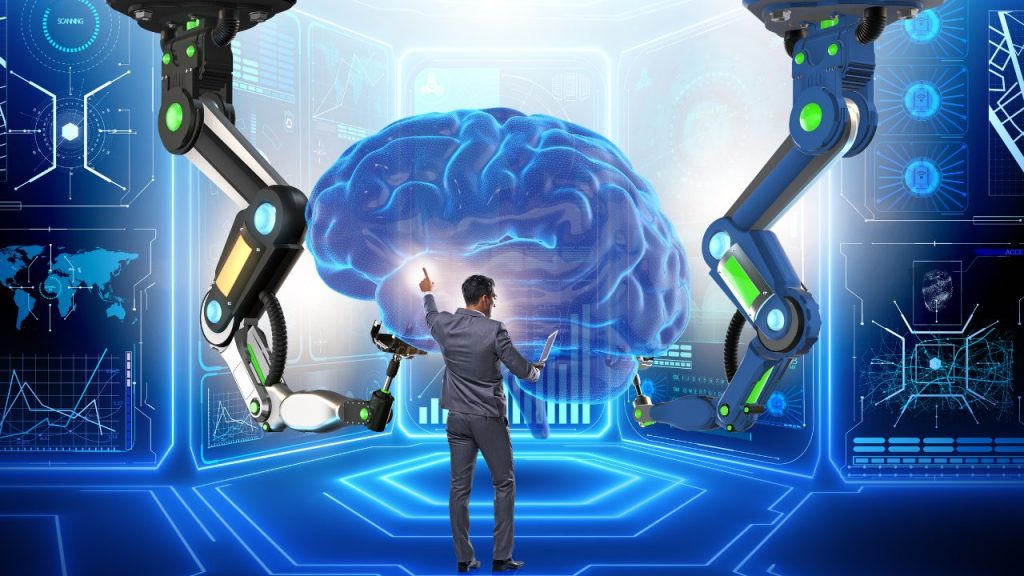The fast rise of technology has brought about substantial changes in the way we live and work. With the advent of artificial intelligence and automation, there is a growing concern about the impact of technology on the labor market. While some say that robots will replace humans in the working, others argue that technology will provide new job opportunities. So, what does the future of employment look like? Will robots actually take our jobs in 2024?

In this blog post, we will analyze the possible impact of technology on the labor market and look at some of the trends that are defining the future of employment. From the emergence of the gig economy to the rise of remote work, we will analyze the numerous variables that are shaping the future of work and help you understand what it means for you and your career.
The present degree of automation in the workforce
Automation has already made great inroads in the workforce. Many sectors have already incorporated automated technologies and processes to boost productivity, decrease human error, and save time. For instance, the manufacturing industry has embraced automation for several decades now, using robots to construct items instead of manual labor.
The automotive sector has also employed automation to optimize the production line, resulting in increased production rates and consistent product quality. Additionally, the healthcare sector has used automation in different methods, including telemedicine, robotics, and artificial intelligence (AI) systems, to help diagnose and treat patients.

It’s evident that automation has become a crucial element of many businesses, and it’s not showing any signs of slowing down. The usage of automation technologies is anticipated to expand dramatically in the coming years as organizations attempt to boost productivity and cut labor expenses.
However, the rise of technology has also sparked concerns about job displacement. Many workers fear that their jobs may be taken over by machines, leaving them without employment. While it’s true that automation will replace certain jobs, it’s also crucial to emphasize that it will create new ones. The idea is to be prepared for the changes and adapt accordingly.
Read More : The World’s Most Advanced Robot In 2023
What jobs are at risk of being automated
With the rapid growth of technology, it’s no wonder that many tasks that once required human labor are now being automated. Jobs that are repetitious and require low skill levels are particularly at danger.
Some of the most at-risk jobs include data entry, customer service, manufacturing, and transportation. These vocations involve duties that can readily be mechanized with the help of robots and artificial intelligence (AI).

However, it’s crucial to realize that not all jobs are at risk of being automated. Jobs that demand creativity, emotional intelligence, and critical thinking are less likely to be mechanized. These include jobs in industries such as healthcare, education, and the arts.
In addition, as technology progresses, new professions will be developed that require human talents and expertise. For example, as more organizations use AI, there will be a demand for employees who can create, program, and maintain these systems.
While the future of work may involve increasing automation, it doesn’t necessarily mean that robots will take all of human employment. Instead, it’s crucial for individuals to develop talents that are in great demand and less likely to be automated.
The benefits and cons of automation in the workforce
Automation is the use of technology and machinery to do jobs that were previously done by humans. In recent years, it has been a common trend in the workforce and has had both pros and cons.
One of the benefits of automation is that it can boost production and efficiency. Machines can work continuously without breaks, which means that jobs can be finished faster and more accurately. This can lead to cost savings for firms and can also increase the quality of work provided.
Another advantage of automation is that it can eliminate the need for human work in unsafe or hazardous conditions. Robots and robots can perform tasks that may be risky for humans, such as working in high heat or cold, or handling toxic substances.

However, there are also drawbacks to automation. One of the biggest concerns is that it may lead to job losses. Machines can undertake duties that were previously done by humans, which could result in unemployment for many workers. This might have a huge influence on the economy and could lead to rising inequality.
Another potential consequence of automation is that it may lead to a loss of skills among workers. As machines take over duties, workers may no longer have the opportunity to improve their skills and knowledge in particular areas. This could lead to a lack of diversity in the workforce and a lower ability to adapt to new challenges and conditions.
In conclusion, while automation can have considerable benefits in terms of efficiency and safety, it is vital to evaluate its possible negatives, including the potential influence on employment and the development of skills in the workforce. As we progress towards a more automated future, it will be vital to discover ways to balance the advantages and disadvantages of new technology in order to establish a sustainable and equitable workforce.
Read More : The Future of Earning Money with Google Bard AI: Tips and Predictions for 2023
The influence of automation on the economy
The impact of automation on the economy is a topic of significant dispute. While some say that automation creates more employment than it eliminates, others believe that the opposite is true. What is obvious, however, is that automation will have a substantial impact on the economy in the years to come.
One of the major ways that automation will damage the economy is through the displacement of workers. As robots and other automated systems become more advanced, they will be able to undertake more and more tasks that were previously done by people. This will undoubtedly lead to employment losses in many industries, particularly those that are very repetitive or need low levels of competence.

At the same time, automation has the potential to create new opportunities in industries that are related to the research, manufacture, and maintenance of automated systems. For example, there will be a demand for engineers, technicians, and software developers who are able to design, build, and manage robots and other automated systems.
Another way that automation will effect the economy is through changes in productivity. As robots and other automated systems become more advanced, they will be able to accomplish tasks more rapidly and efficiently than people. This will likely lead to advances in productivity and efficiency in many areas, which could have a good impact on the economy as a whole.
Overall, the influence of automation on the economy is complex and multidimensional. While there are clearly risks and concerns involved with automation, there are also potential for innovation, growth, and better efficiency. It will be necessary for governments, corporate leaders, and employees to negotiate these changes carefully in order to ensure that the advantages of automation are shared widely and equitably.
The possibility for fresh job development in an automated economy
While it’s true that automation and robotics will inevitably replace certain professions, it also has the ability to create new jobs that don’t now exist. In an automated economy, the necessity for people to manage and maintain the machines will expand. Additionally, there will be new opportunities produced in businesses that enable automation, such as software development and engineering.
For instance, the deployment of self-driving automobiles would create a demand for technicians and mechanics who can maintain and repair the vehicles. There will also be a demand for software and hardware developers to build and fine-tune the technology.

Moreover, the rise of automation will generate new opportunities in businesses that are not typically linked with technology. For example, in the healthcare industry, robots can be employed to assist with surgeries and do other medical activities. This will require qualified personnel who can operate and manage the equipment.
While the future of work is unknown, it’s vital to remember that while some occupations may go, new ones may arise. It’s up to us to adapt and skill up to take advantage of these new chances.
Read More : ChatGPT: Changing the Future of Financial Research on Major US Companies in 2023
The significance of education and skills training in preparing for the future of work
As the future of work continues to shift, it becomes more crucial than ever to focus on education and skills training. With the rise of automation and technology, many jobs will become obsolete, while new jobs needing different talents will arise. This means that workers need to be upskilled and reskilled to stay relevant and useful in the labor market.
Employers also need to invest in training and development programs to guarantee their workforce is prepared with the required skills and knowledge to succeed in the future of work. This could include training in areas such as data analytics, artificial intelligence, and digital marketing.

In addition, there needs to be a shift towards lifelong learning, where individuals continuously learn and adapt to be relevant in the employment market. This could entail online courses, mentorship programs, and apprenticeships.
Ultimately, the value of education and skills training in preparing for the future of employment cannot be emphasized. It is the key to ensuring that individuals are able to take on the tasks of the future, and that firms remain competitive in a fast changing employment market.
The importance of adapting to changing technologies and job roles
The fast progress of technology is reshaping the workplace at an unprecedented rate, and it’s apparent that new technologies and job categories are emerging all the time. It’s consequently vital for workers to adapt to these developments to remain competitive in the employment market.
For instance, automation and artificial intelligence (AI) are ready to take over many monotonous activities, freeing up workers to focus on higher-level talents such as critical thinking, problem-solving, and creativity.

In addition, new employment opportunities in areas such as cybersecurity, data analytics, and digital marketing are rapidly emerging, and workers who have the required abilities and are eager to learn will be well-positioned to succeed in the future.
Employers also have a role to play by investing in training and development programs that provide their workers with the required skills to flourish in the digital age.
The bottom line is that people who are willing to adapt and learn new skills will be best placed to take advantage of the opportunities that arise from new technology and job responsibilities.
Read More : 14 New Future Technology in 2030 That Will Change The World
The ethical issues of automation and job displacement
Whenever the topic of automation and job displacement comes up, a lot of attention is given to the ethical implications surrounding these difficulties. It’s not only about the firms that will gain from higher production and decreased labor costs. The impact on workers who may lose their jobs or be compelled to learn new skills is a significant concern.

One of the important ethical challenges to examine is the obligation that firms have to their employees, especially those who have been loyal and committed to the organization for many years. Will employers take the required efforts to retrain their employees, or will they just replace them with machines and robots?
Another ethical problem is the potential for growing income inequality. While automation may boost productivity and cut costs for organizations, it could also lead to a concentration of wealth in the hands of the few who own the machines and automation technologies. This could lead to a greater divide between the rich and poor, further exacerbating current social and economic disparities.
Finally, there are concerns regarding the influence of automation on society as a whole. As more employment are lost to automation, there may be a fall in consumer spending and an increase in poverty and social instability. Governments may need to step in with policies and programs to support workers who are displaced by automation and to guarantee that the advantages of automation are spread more broadly across society.

The ethical implications of technology and employment displacement are complicated and multifaceted. As we progress towards a more automated future, it’s crucial that we evaluate these challenges thoroughly and devise solutions to handle them.
The possibility for a Universal Basic Income (UBI) in an automated economy
As automation grows increasingly ubiquitous in the job, talks regarding Universal Basic Income (UBI) have grown louder. UBI is a system where every citizen receives a guaranteed income from the government, regardless of their employment status. This concept has been around for years but has recently gotten increasing attention as a viable answer to the difficulties of automation and job displacement.
One of the key reasons in support of UBI is that as technology continues to replace occupations, there will be fewer chances for people to earn a living through traditional kinds of employment. This might lead to widespread poverty and economic instability. With UBI, people would have a safety net to fall back on, allowing them to pursue education, training, or start their own enterprises without the worry of financial ruin.

Read More : ChatGPT Voice Just Killed Traditional Language Learning
Critics of UBI, on the other hand, say that it could disincentive labor and lead to a fall in productivity. They also point out that creating such a system would be costly and could lead to greater taxes for everyone.
While it remains to be seen whether UBI will become a reality, it’s apparent that the discourse surrounding it will only continue to increase as automation becomes more widespread in the working. As a society, we must struggle with the question of how to sustain those who are displaced by technology, and UBI is just one possible response.
Conclusion:
In conclusion, the future of labor is not fixed in stone, and it is difficult to forecast with certainty what will happen. However, it is evident that technology will play a key role in defining the future of employment, and it will have both positive and negative implications. While robots and automation may take over some employment, new jobs will also be created. The key to preparing for the future of work is to be adaptable and embrace change.

One strategy to prepare for the future is to gain talents that are in demand and likely to remain in demand. These include skills such as critical thinking, problem-solving, creativity, emotional intelligence, and computer literacy. It is also crucial to keep up with the newest trends and innovations in your field and to be willing to learn new skills.
Another method to prepare for the future of work is to be open to new opportunities and explore non-traditional work arrangements, such as freelancing, remote employment, and the gig economy. These arrangements give greater flexibility and autonomy but also need greater self-discipline and self-motivation.
Ultimately, the future of work is about adjusting to change and being adaptable in the face of uncertainty. By remaining informed, learning new abilities, and accepting new possibilities, you may position yourself for success in the shifting economic world.
We hope you enjoyed our blog post about the future of work and the potential influence of automation on labor markets. While there are clearly fears about the rise of robots and artificial intelligence, there are also many reasons to be hopeful about the future of work.

By remaining updated about new technology and trends, you can position yourself for success in the years to come. After reading this essay, we hope you have a better sense of what to expect in the employment market in 2024. As always, we appreciate your readership and urge you to express your ideas on this topic in the comments area.
Read More : Robots From CHINA Are Taking Over The World In 2023

Hello I am Habib Hasan. I am an Internet Marketing Expert, Business Advisor, Programmer and Tech Advisor with skills in Technical SEO and Web Design, Web Developer.
